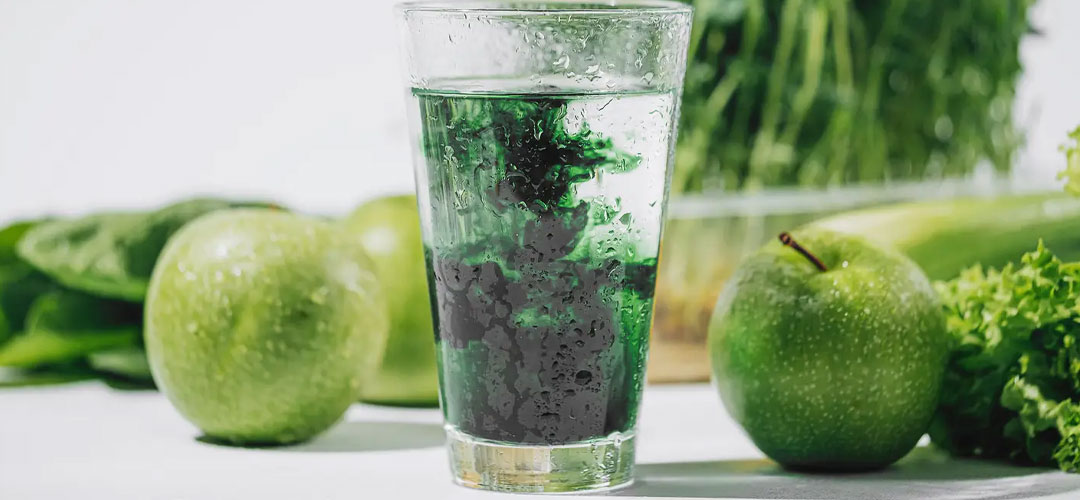
Chlorophyll is a pigment and phytonutrient that is thought to offer human health benefits.
It’s found naturally in certain plant foods, but many people use it as a dietary supplement. This article covers the potential health benefits of chlorophyll, plus safety information and how to use chlorophyll.
• What Is Chlorophyll?
Chlorophyll is a green pigment that helps plants, algae, and some bacteria convert light into usable energy during the process of photosynthesis.1 Chlorophyll comes in various forms, including a, b, c, d, and e, with chlorophylls a and b being the most common.2
While many edible plants contain a natural form of chlorophyll, supplements are often made with chlorophyllin. Chlorophyllin is a synthetic form of chlorophyll. Unlike chlorophyll, chlorophyllin is water-soluble and contains a copper atom at the center of its structure instead of a magnesium atom.3
Historically, chlorophyll and other plant pigments were used as food colorants. However, some research suggests that chlorophyll may provide certain health and nutrition benefits.4

• Potential Benefits of Chlorophyll
Chlorophyll is vital to plants, but there is some evidence that it may be beneficial to humans as well.
Chlorophyll is a phytonutrient, which is a bioactive compound found in plants that may provide human health benefits. As a phytonutrient, chlorophyll has been found to possess antioxidant, anti-inflammatory, and even anti-cancer properties.4
In addition to these properties, chlorophyll contains nutrients, like vitamins and minerals, that are important to human health. Nutrients found in chlorophyll include vitamins E, A, C, and K, and the minerals magnesium, potassium, iron, and calcium. Chlorophyll is also a source of essential fatty acids.4
Although research is still emerging, some studies suggest that chlorophyll may help treat certain health conditions, including:
-
- Diabetes
- Inflammation
- Obesity
- Certain cancers4
There is also some evidence that chlorophyll may support the body’s natural detoxification processes. Specifically, chlorophyll may bind to certain toxins and help the liver and kidneys get rid of them.1
Older studies suggested that chlorophyll improves wound healing and works as a natural deodorant. However, these findings haven’t been duplicated in recent years.
Overall, consuming chlorophyll-containing foods or supplements may support certain aspects of your health. More research is needed, however, so we can have a better understanding of chlorophyll’s role in human health.
• Is Chlorophyll Safe?
Chlorophyll is generally considered to be safe for most people to use.
Some people may experience mild side effects when using chlorophyll supplements. Possible side effects include:
-
- Diarrhea
- Loose stools
- Green stools and urine
- Stomach cramps
- Yellow or black tongue
- Mild burning or itching on the skin5
Little is known about the safety of chlorophyll supplements for those who are pregnant or breastfeeding. It’s recommended that you consult with a healthcare provider if you’re interested in using chlorophyll while pregnant or breastfeeding.
It’s always a good idea to talk with a healthcare provider before using any new supplement. This is especially true if you have any medical conditions or take any medications.
It’s also helpful to look for supplement products that have been vetted by third-party agencies. These agencies test supplements for quality and ensure accurate manufacturing. However, a seal from a third-party agency doesn’t guarantee effectiveness.6

• How To Use Chlorophyll
Chlorophyll is found in certain foods as well as dietary supplements. Whichever you choose to use is up to you.
Green plants contain chlorophyll, which means green vegetables are an excellent source. This also means you can increase your chlorophyll intake by eating more green veggies.
Dark leafy greens, like spinach, kale, and arugula are sources of chlorophyll. Other sources include broccoli, asparagus, green beans, and spirulina.
Chlorophyll supplements can be found in many different forms.
Liquid chlorophyll is a popular supplement option as it can be easily mixed into foods and drinks. You may also use chlorophyll supplements in the form of soft gels, capsules, or powders.
You can buy chlorophyll supplements online or in health food stores and supplement shops.
A chlorophyll dose between 100 milligrams (mg) and 300 mg per day is often recommended.
However, more research is needed to determine proper chlorophyll dosing. Therefore, it’s best to follow dosing directions as listed on the supplement label or as recommended by a healthcare provider.
• Summary
Chlorophyll is a green pigment that plants need for photosynthesis. When consumed, chlorophyll may provide health benefits.
There is scientific evidence that chlorophyll may have antioxidant, anti-inflammatory, and anti-cancer properties, among others. Chlorophyll may also help treat certain health conditions, like diabetes and inflammation, but more research is needed.
Green vegetables are a common source of chlorophyll. Chlorophyll can also be found in dietary supplements, like liquids, capsules, and powders.
Chlorophyll is thought to be safe for most people to use. However, it’s recommended that you talk with a healthcare provider before giving chlorophyll a try to make sure it’s a good fit for you.
References
1. Martins T, Barros AN, Rosa E, Antunes L. Enhancing Health Benefits through Chlorophylls and Chlorophyll-Rich Agro-Food: A Comprehensive Review. Molecules. 2023;28(14):5344. doi:10.3390/molecules28145344
2. Britannica. Chlorophyll.
3. Yang Y, Jiang X, Pandol SJ, Han YP, Zheng X. Green Plant Pigment, Chlorophyllin, Ameliorates Non-alcoholic Fatty Liver Diseases (NAFLDs) Through Modulating Gut Microbiome in Mice. Front Physiol. 2021;12:739174. doi:10.3389/fphys.2021.739174
4. Ebrahimi P, Shokramraji Z, Tavakkoli S, Mihaylova D, Lante A. Chlorophylls as Natural Bioactive Compounds Existing in Food By-Products: A Critical Review. Plants (Basel). 2023;12(7):1533. doi:10.3390/plants12071533
5. MedlinePlus. Chlorophyll Poisoning.
6. National Institutes of Health. Dietary Supplements: What You Need to Know.
Disclaimer:
Information and other content provided in Lily & Loaf blogs should not be construed as medical advice and should not be considered a substitute for professional medical expertise. If you have any medical concerns, you should consult with your health care provider.





